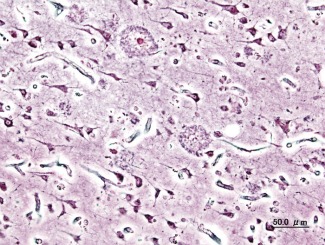Neuroprotective effects of exercise against Alzheimer's disease

The research is one of the most complete studies carried out up to date, not only given the indicators measured (behavioural and physiological), but also due to the exercise patterns examined (short and long periods, beginning at different stages of the disease: early and moderate).
"Effects were best seen in seven-month old mice, since they were in the moderate stage of the disease and had spent more time exercising continuously since they were a month old", explains Coral Sanfeliu, CSIC researcher at the Barcelona Institute of Biomedical Research (CSIC-IDIBAPS) and director of the study.
It is long known that exercise contributes to the freeing of protective substances and has beneficial effects on the sensation of wellbeing and other bodily and mental functions. Until now however its beneficial effects against Alzheimer's disease had not been studied systematically.
The animal models used in the study - 3xTg-AD transgenic mice which develop a pathology similar to Alzheimer's disease - were divided into several groups. One group had access to the mouse wheel during a month while they were in the early stage of the disease and were examined at four months of age. Other groups had access to the wheel during a period of one to six months and were examined at seven months of age, when they were already in the moderate stage of the disease. At the same time, two other groups of mice served as control. One group had no possibilities of exercising and the other was made up of healthy mice.
The group which did not have the chance to exercise presented psychological symptoms of dementia and cognitive decline, as well as alterations in synaptic functions and long-term potentiation (long-lasting enhancement in communication between two neurons which determines the ability to remember and to retain new information), and deterioration in sensory-motor functions. In contrast, the mice with access to the exercise wheel presented better results in all psychomotor, memory and learning tests, displayed less anxiety when faced with stressful situations and a better control when responding to shocks.
The assessment of these indicators was carried out using usual methods such as signalled water mazes in which mice must remember the path taken, and levers.
Thanks to electrophysiological tests researchers were able to determine that exercise protects synaptic communication between neurons. José María Delgado, researcher of the University of Pablo de Olavide who took part in the study, explains that "the results obtained suggest that physical exercise has beneficial effects on cerebral cortex activities and this represents greater memory in the long term and a greater capacity for complex learning".
Researchers analysed the cerebral cortex tissue and hippocampus, areas which are neuropathologically affected by the disease. Relevant physiological indicators, such as oxidative stress in the brain, improved in animals which exercised, which reveals the importance of voluntary and moderate exercise as a neuroprotective factor.
Data obtained cannot be easily extracted to humans, but it does suggest that physical, and most likely intellectual exercise can be beneficial in the mid-term to slow down specific symptoms related to Alzheimer's disease and linked to normal aging.
The research was funded by Fundació La Marató TV3, as part of a larger project on environmental stimulation in Alzheimer's disease, coordinated by lecturer Lydia Giménez-Llort from the UAB Department of Psychiatry and Legal Medicine, with the support of other organisations such as the Ministries for Science and Innovation and for Health.


